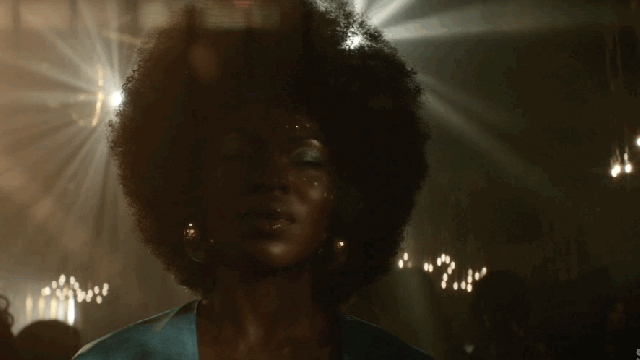The first season of American Gods teemed with great introductory scenes that made you want to know more about its beguiling characters. And no one got a better intro than Bilquis, the love goddess played by Yetide Badaki.
Image: Starz
When we first meet Bilquis, the goddess’ awkward internet date turns into a hallucinatory ritual sacrifice that defies belief. But belief — and the hunger for it — is what makes Bilquis’ all-encompassing sex acts possible. Bilquis’ journey over the course of American Gods‘ first season turned out to be one of the most surprising, largely due to the revelations shown in the finale episode.
I talked to Yetide Badaki after the finale aired about how she got into the headspace to make Bilquis come alive, and how her own immigrant story makes working on American Gods so meaningful to her.
Hanging With the Dream King
The woman playing the Queen of Sheba has been a Neil Gaiman fan for a long time, and had to work on not geeking out too hard during her audition.
Yetide Badaki: I was a big fan of The Graveyard Book; it’s just a beautiful story. Beautiful and that coming of age thing was just so well portrayed. And then, of course, Neverwhere and then the collaborations with Terry Pratchett. From there, I started looking to just his musings. I feel like anytime Neil puts pen to paper, something beautiful happens. He might just be writing about what he’s seeing out of his window at the moment, and it’s always poetic and interesting and deeply resonant with the human experience. So, yeah, I have pretty much all of his writing.
I read American Gods in 2001 when it came out. I tell people I’m a geek, but they don’t seem to get how much of a geek I am. I mean right now, I’m watching [the new] Mystery Science Theatre 3000. If you missed the whole season, at least watch the one called Starcrash. It’s just brilliant. And you will cry laughing. And as far as books, I’m doing a re-read of more Gaiman. I love science fiction and fantasy.
Anyone who’s an actor in Los Angeles knows February is part of pilot season. So it’s a crazy time for everyone in the industry, because it’s tons of auditions and people trying to parse all kinds of different universes. And there were all these auditions coming in and you go through and you read, you get excited, but you learn to leave it behind, because you know — it’s pilot season. But I remember stopping when I saw that invitation come in via email and my heart jumped. “Wait, how did I not know this was in development?!”
And it was about managing my expectations as well because, being such a big fan, the danger is walking in and just freaking out, which I’ve done a couple of times. This time, all that energy was able to be focused, which is part of the reason I think the stars were aligned. Because, very quickly after that, they called me back in to do a producer session with Bryan [Fuller] and Michael [Green]. And Bryan was just incredible with doing the redirection there.
Before that I was trying not to dive into all the articles, because — again, managing expectations. But as soon as I heard I would be playing Bilquis, then I read all the articles where they were discussing about bringing this to life and all the people who were already involved, and it felt like, weekly, more and more gold was added to this treasure chest of people being announced, like Gillian Anderson, Crispin Glover, Ian McShane — it was incredible.
Love Queen and Dead Wife
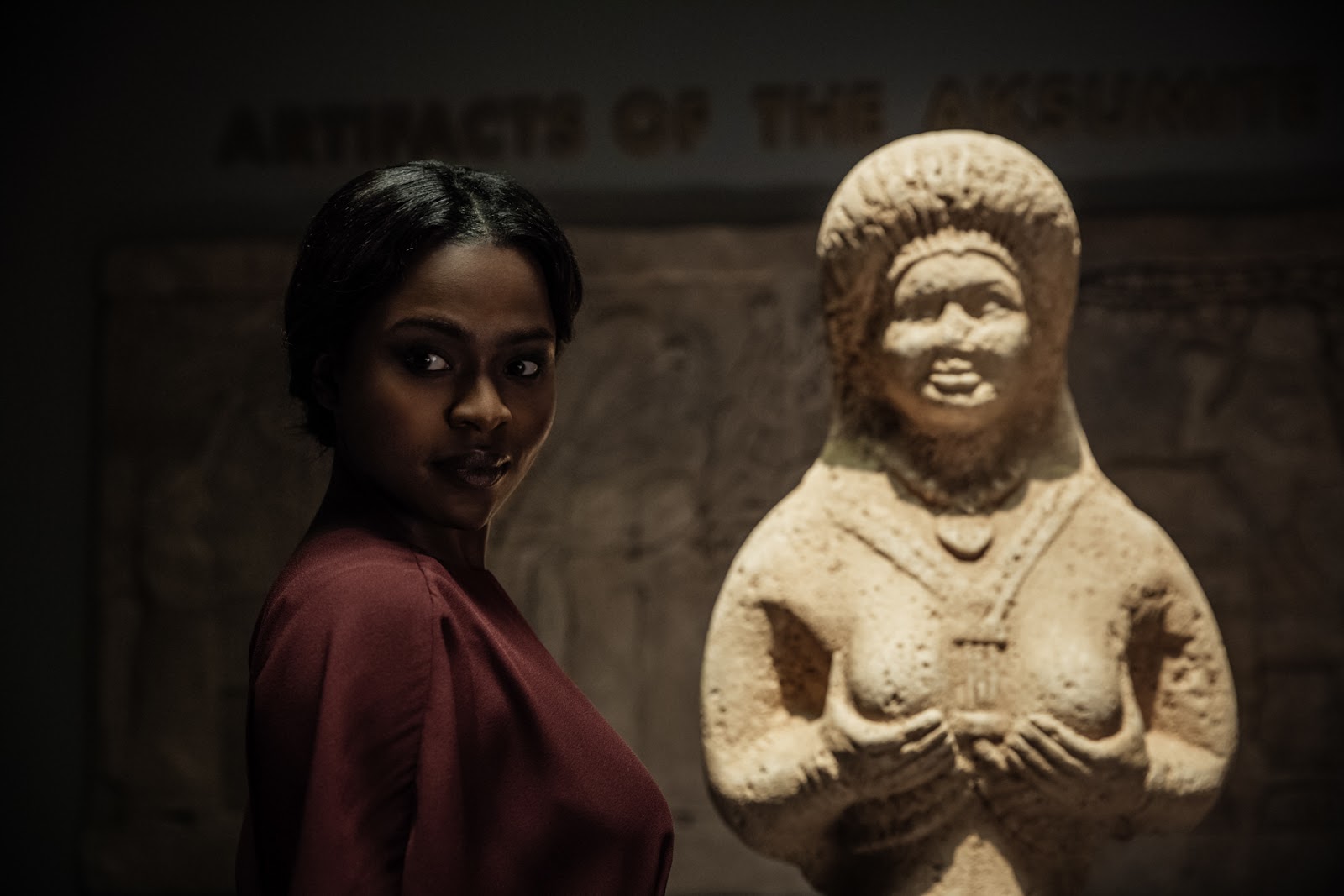
Badaki says that she knew early on that things were going to be different for Bilquis on the show.
Badaki: It was after I had the contract read to me. I didn’t know that I was looking at series regular. And when my agent was reading all this information, and I’m like, “series regular?” She gets like, two scenes in the book. When I lifted the embargo on myself and looked at all the interviews and information that was already out there, I saw Bryan was talking about wanting to expand the female characters, Laura Moon and Bilquis, in particular.
Finding Godliness in Humanity
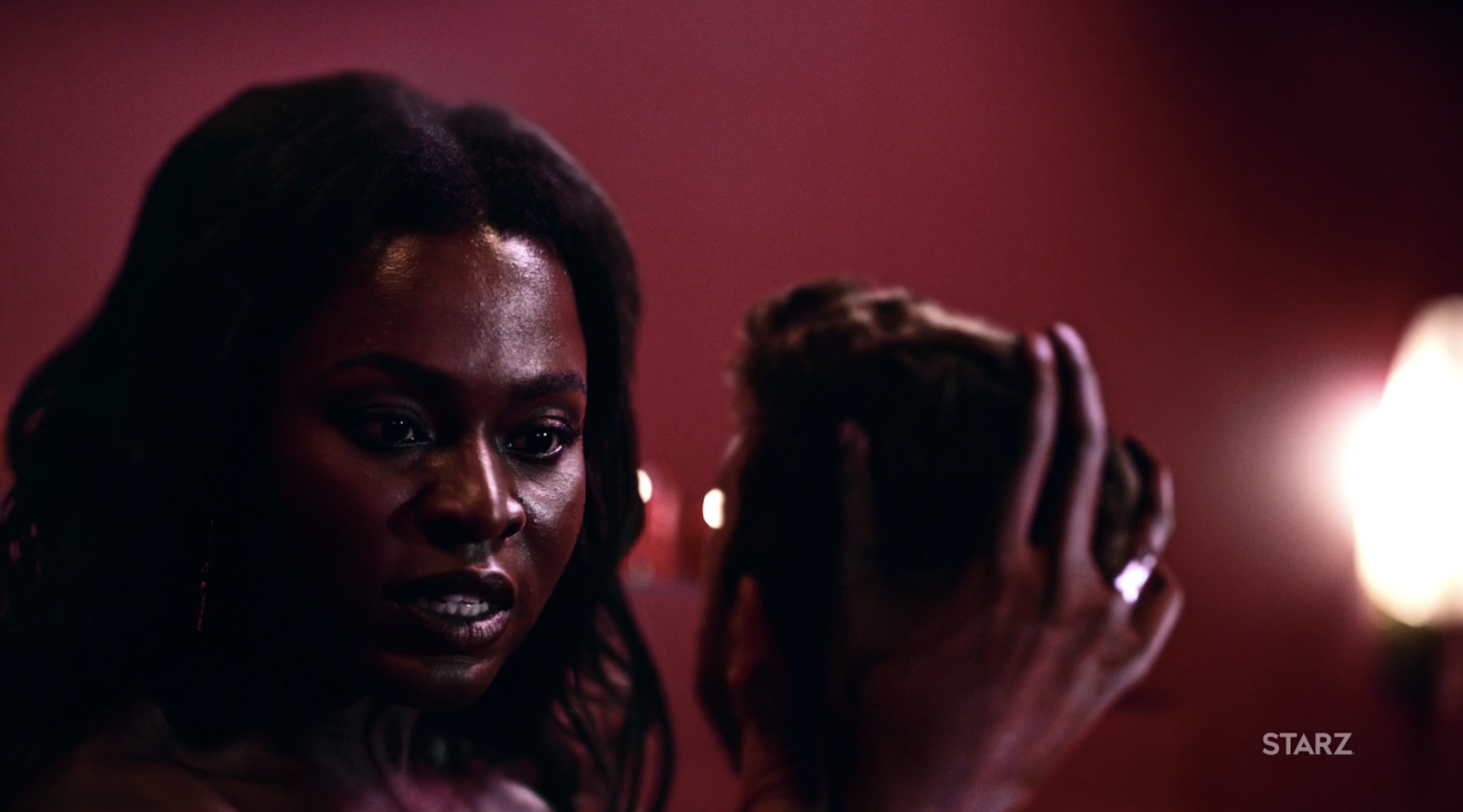
When we first meet Bilquis, she seems like the ultimate cosmic seductress, one who feeds off people and absorbs them whole. I asked Badaki how she got into the headspace of trying to make that feel physically palpable.
Badaki: Hmm. Well, first of all, for me, I think it was about the headspace of “how does one play a god?” And the answer came back, surprisingly quickly and surprisingly easily, even as far back as the audition. In approaching that scene, what jumped out at me was that deep-seated need for the human connection. And it immediately pointed out to me that, yes, they may be gods, but they are human constructs. And that they have in many ways very human wants and needs.
Not that everyone needs to devour people. That’s a little different. But things like attention, which we may refer to as “worship”. Things like connection, being needed, being seen and understood and interacted with. These are deep human needs. What presented itself was: To play a god, just dive into the deepest human experience.
Then, because I’m a geek, there was also a lot of fun research. That excited me. Looking into the Queen of Sheba and seeing all the gaps, historically, that occurred in her stories. And then, filling those gaps with other things I found. I read this really wonderful article about these girl goddesses in Nepal. And they’re these girls — these young girls are brought in basically to audition for the part of human embodiment of the goddess. And so the one that’s picked then lives as the goddess. However, that article was fascinating to me because of what happens after that — they hit puberty. And they can no longer be the goddess. And so they’re now trying to live like everyday people — that was so fascinating to me. How do you go from being a god to an everyday person?
Lots of fun research presented itself this way. I also looked at studies about present-day intimacy and what’s happening with the millennial generation and them having less intimate connections than in the past. Both physically and figuratively. And their grandparents. And their parents before them. This was all very topical. Really relevant. These are all issues we’re dealing with now. So it was a lot of fun to be able to use all the different pieces of the jigsaw puzzle in research to build this goddess.
Been Here for Aeons
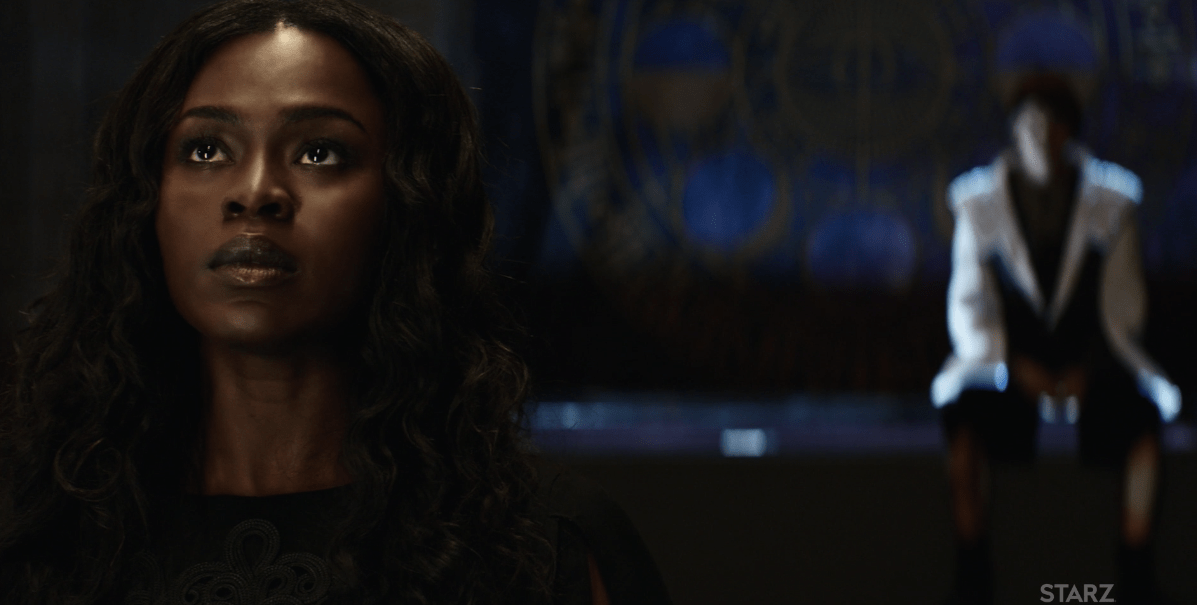
In the finale, viewers see how temptress Bilquis faces another kind of seduction — using Technical Boy’s online dating app — just to survive. Badaki talked about how she was able to reckon with this plot point.
Badaki: One of the great things that’s laid out already for us as actors and performers is that these are old gods. Time is experienced very differently. If you lived for aeons, a matter of hours or days is nothing. And I like pointing out that’s a great juxtaposition of the old and the new in that museum scene with Bilquis and Technical Boy. He was all words, and quick, and his pace was just go, go, go. Meanwhile, Bilquis’ movements are slow and deliberate. There’s a lot of space and air between words.
I feel like if you dug further under the remains of Lucy, you would find paintings on the wall of Bilquis. So, as far as motivation and what appears to be happening at any given moment with the old gods, I think it’s great to remember that they have been around for a while and that their chess game is very different. And it’s played very differently. And it’s played for the long run. And they’re survivors. I mean, they’re old gods for a reason. They’re pretty scrappy. So, I didn’t feel that it was necessarily an inversion, but I do feel it is part of a long game.
Dancing Deity
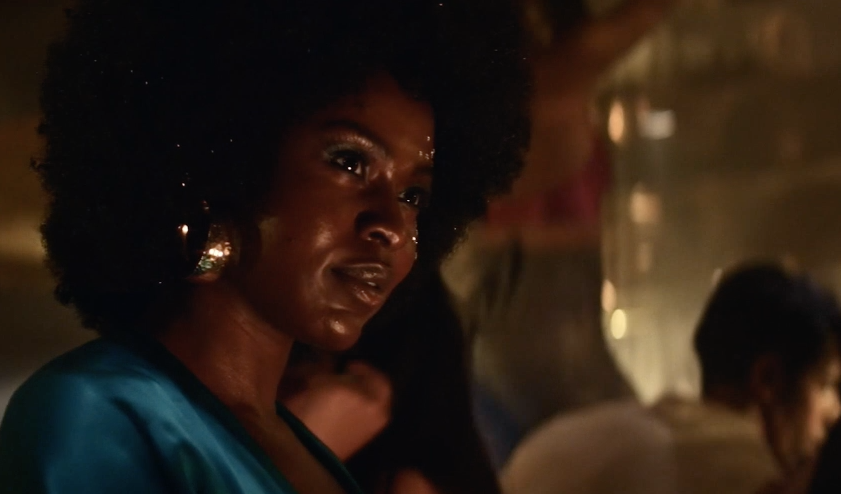
The 1970s flashback was the most joyful Bilquis-centric scene in the first season and Badaki got into the spirit.
Badaki: It was a blast. They said, “Hey, we’re going to put you in a fro and a Grace Jones inspired outfit with dancing music created by Debbie Harry.” You can’t help but celebrate! And that was one of the things that actually our costume designer wanted to make sure that there was no restriction of movement in it. She wanted it to be expressed that this was a time of absolute freedom.
Everything that her gift represents — joy and free love and connection — was there in the form of a party. And it’s a thing of beauty that we get to see her still at her heights even after aeons have passed.
If you look back historically before that time, Persian women had a very different experience, which was closer to what we tend to call the Western norm in the present day. When the revolution occurred in 1979, all that agency was removed. It was a lot of fun to be able to play that joyous moment before, to be completely free, to basically embody this celebration of an incredible group of people. And it was just nice to see Bilquis happy.
A Third-Culture Goddess
As someone who was born in Nigeria and moved to London and back before going to the United States, Badaki says the show’s themes of immigration resonate deeply with her.
Badaki: I was actually born in Nigeria. From three to six weeks old, I was brought to England, briefly. But then I moved back to Nigeria and stayed there until I was 12. And around that time there was political unrest. We had had the same president, Babangida, from the time I was born up until the 1990s. He had come in through a military coup.
He would still hold elections but he was counting on our divisiveness because we’re made up of several different cultures, different tribes, and the three main ones, the Igbo, Hausa and Yoruba — there’s all kinds of anecdotes about how we don’t get along. And so he would always just kind of throw out a result saying, “Ah, y’all didn’t agree on anyone.”
But one year, there was someone everyone just fell in love with. He read the results again and people just lost their minds. There’s only so long people can be repressed before they have had enough. Things got really intense. I remember being in school and we’re looking out and we’re seeing, “What is that?” We realise we’re seeing smoke come from all around, like smoke clouds. Literally, people were burning things in the streets. And I remember somebody came to our school and told the headmaster that they should send the children home because they wouldn’t be responsible for what happened to us.
This was before cell phones so there was a rush of people trying to reach family. I remember that day my brother and I did what we called in the Long Walk — in honour of Stephen King — we walked home on the back roads. I have to give so much gratitude and love to my brother because I was still quite young then, but he made what was a terrifying situation into an adventure. We got home fine, and all of that unrest went on for a while.
I remember even being with my mum in the car another day, and people had stopped up the street. It was like Walking Dead. I watch that show now and I’m like “flashback”. But it was just all these bodies pressed against the car. The thing I get now, is that they weren’t angry at me, or my mum or my brother. There was just so much repressed anger. It was volcanic. Just this unfocused rage. So, to make a long story short, we did leave at that time because my father had been offered a job at World Bank, but he wanted us to grow up in Nigeria. But what had happened definitely changed things, so we moved to the States.
That’s why American Gods resonates on so many levels. [In the novel] Neil talks about what happens when people move to a new land, “What are the things they leave behind? What are the things they take with you?” My only thing that I have from then is my passport, which looks like a book now, with pictures of six-year-old me, but it’s the only thing I have from my childhood.
I was also just entering my teens. I was in a new place. I didn’t quite fit in. Also, after a couple years, I could no longer identify as specifically Nigerian. There were also different ideas I had. Many years later, it was wonderful to run into the concept of TCK, the Third Culture Kid. It’s a term that is for people who come from one culture into a new culture and are not necessarily identified with either, which then creates a third culture. Literally.
It’s something I often think about, being Haitian-American. I live in Austin now, which is away from the Caribbean hubs that I grew up around. How do I transmit this sense of culture I’m still so proud of to my daughter without any tangible reference?
Badaki: But that’s where stories come in. Storytelling. There have been so many papers written about storytelling, its significance for passing on ideas and culture and belief. That’s why I became an actor, going back to that tradition. Representation matters. We need to see our stories reflected back at us. In a multitude of ways. Not just one way. We need to see the entire experience.
This is the last interview in the Conversations with God series where I spoke with actors from American Gods. You can read the previous entries here, here and here.
